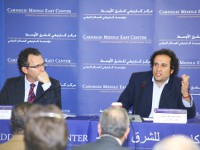Registration
You will receive an email confirming your registration.
Egyptian democracy has been undermined by nearly six decades of authoritarian rule, under military figures who ascended to the presidency. This rule crippled government institutions and exacted a harsh toll on the country’s economy, with profitable enterprises presented as rewards for those loyal to the regime. Former Egyptian President Hosni Mubarak—sworn into office in 1981—was widely recognized as maintaining power by rigging electoral rounds and supported by an entrenched political and business elite.
In a discussion hosted by the Carnegie Middle East Center, Carnegie’s Amr Hamzawy examined the factors that sparked Egypt’s revolution and enabled its success. Hamzawy is a member of the League of Wise Men, seeking to help shepherd Egypt through its critical transition period. He discussed the complexities of transitioning from an authoritarian regime to an active democracy.
Key Features of the Egyptian Revolution
- A genuine democratic and popular revolution: The Egyptian revolution was not simply a revolution of the country’s youth, Hamzawy stated. Citizens of different ages and from different sectors of Egyptian society all took to the streets. The protestors’ demands were not ideologically charged, he added, but democratic—based on the need for economic reform and social justice. While the slogans chanted by the Egyptians were based on those seen in Tunisia, they reflected a strong popular will for real and substantive change.
- Empowerment of the citizens: The idea that revolution is contagious merits attention, Hamzawy said. The arrival of 6,000 protestors on the streets of Cairo was unprecedented. These protestors were undoubtedly influenced by the Tunisian revolution only days beforehand. The citizens felt empowered by their discovery of the weakness of authoritarian regimes when faced with a tenacious crowd with collective demands for change and by the clear demonstration that common people could achieve change without traditional mediators, such as political parties, established leaders, or other interest groups.
- Significant challenges ahead: Hamzawy acknowledged the significant achievements of the Egyptian revolution, which ousted the ruling Mubarak family and its inner circle and has led to great structural changes. However, he warned that large pitfalls remain. He suggested that the transitional phase should be divided into two parts: the first phase should include presidential and parliamentary elections, while the second phase would draft a modern constitution for Egypt that enshrines democratic practices, the separation of powers, and the rule of law. Some of this effort has already begun, Hamzawy said, with particular attention to the laws surrounding the formation of political parties.
- Toward an inclusive system: The revolution initiated a new sense of political participation and activism among the Egyptian people, Hamzawy said. This is epitomized in the ongoing exchange and constructive interaction between the people and the National Council for Dialogue.
- Instituting a responsible government: The principles of transparency and accountability should be the most fundamental outcome of the revolution, Hamzawy said. Public officials can no longer function without any regard for the framework of the state and judicial system.
- Redefining the role of the military: Hamzawy emphasized the importance of security sector reform. It is important to seriously consider the military’s role in a new Egypt. For example, Hamzawy asked, should the Egyptian military play a role similar to that of their counterpart in Turkey? He added that the military has declared its intention to focus on preserving national security and not actively engage in the new political system.
Hamzawy concluded that, in spite of all of these achievements, more needs to be done for the revolution to truly blossom. Egypt’s youth must assemble and mobilize themselves for political participation. Parliamentary quotas for women and minority groups, such as the Copts, will increase their political participation. Hamzawy also advocated the formation of the league of transitional justice to ensure the swift transition of Egypt to democracy. At the end of the day, however, the most efficient guarantee of a successful revolution is the newly empowered Egyptian citizen, Hamzawy said.
